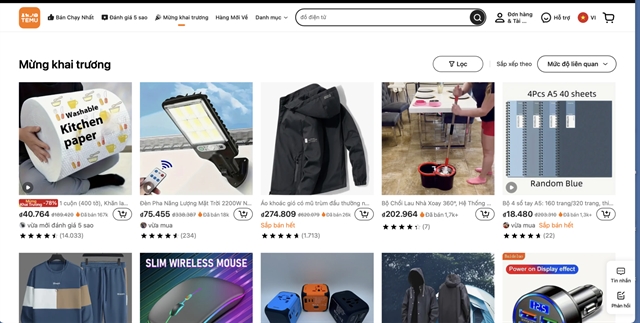 Economy
Economy

 |
| Goods were sold at Temu before the Chinese e-commerce platform suspended its operations in Việt Nam. — Photo baotintuc.vn |
Compiled by Thu Trà
HÀ NỘI — The Chinese e-commerce platform Temu has been told to suspend its operations in Việt Nam following its failure to meet an end-November deadline for business registration.
The Ministry of Industry and Trade’s Department of E-commerce and Digital Economy said it had asked Temu’s owner – Elementary Innovation Pte Ltd – to perform several measures to comply with Việt Nam’s regulations for e-commerce.
The requests were made based on trade regulations that are specified in the Government’s Decree 52/2013/NĐ-CP and Decree 85/2021/NĐ-CP.
The Chinese platform has now stopped showing content in Vietnamese on the website temu.com and the Temu mobile application. It also informed viewers that its business registration application is being reviewed and has not yet been approved by the trade authorities.
The platform also stopped showing Vietnamese viewers products and goods with promotions of more than 50 per cent while halting programmes and models that encouraged Vietnamese users to participate in business to receive bonuses and commissions.
According to Hoàng Ninh, the department's deputy director, Temu had submitted its registration documents but had not yet completed the process. If Temu failed to finalise its registration by November 30, it would be required to cease operations.
Ninh told VietNamNet that his department recently instructed Temu to suspend its activities until all registration procedures were completed.
Vietnamese-language options are unavailable from Temu's website when accessed from Việt Nam.
"Temu is working with the Vietnam E-commerce and Digital Economy Agency and the Ministry of Industry and Trade to register to provide e-commerce services in Việt Nam," the company in a notice on the website.
However, the timing of Temu's return has not been determined.
A 'short-lived' phenomenon in the Vietnamese market?
Temu, owned by Chinese e-commerce giant PDD Holdings, is considered one of the world’s fastest-growing e-commerce platforms, with sales estimated at $30 billion by the year-end. It started allowing shoppers from Việt Nam in October.
Nguyễn Đức, Director of the Hà Nội-based Viet A Media JSC, said that Temu's success in major markets came from its strategy of exploiting the specific needs of each region.
Temu has affirmed its position in the home turf thanks to a model that combines wholesale and entertainment, similar to Cosco and TikTok.
Meanwhile, in the US, the platform has attracted consumers by bringing products from Chinese factories directly to customers with a free shipping policy. This is especially attractive to Americans when they have the opportunity to access cheap goods conveniently, Đức told doanhnhansaigon.vn, adding that Temu faced significant challenges when entering the Vietnamese market.
Previously, Temu attracted Vietnamese customers mainly thanks to the 'spin to win' programme with discounts of up to 70-80 per cent on some products. However, most of the products that were not on the promotion list had prices higher or equivalent to those on platforms such as TikTok Shop or Shopee, Đức explained.
Most Vietnamese consumers were often attracted by free shipping policies and temporary low prices. But they were also smart ones and easily recognised the true value of a product.
Many customers said they were disappointed when receiving goods with a 70-80 per cent price reduction ordered from Temu while prices of quality items were no different from that of other platforms.
According to Đức, when Temu ran out of promotional programmes, the company seemed to lack the differentiating factors to retain customers.
Chairman of Vinalink Media Tuấn Hà said despite the sharp decline in prices of goods that Temu would offer, consumers would eventually return to familiar platforms because they did not need to buy more.
As quoted by doanhnhansaigon.vn, Hà said that customers prioritised buying essential goods like rice, meat and gasoline at a cheap price rather than unnecessary items.
Fierce competition
The Vietnamese market has long been the arena of Lazada, Shopee and most recently TikTok Shop. Shopee allows sellers to compete on price while TikTok Shop combines entertainment elements to promote shopping needs. It seems that Temu fails to bring up a noticeable difference, experts have said.
Hà from Vinalink Media agreed. He said that when entering the Vietnamese market, Temu used familiar strategies including taking advantage of the affiliate marketing network to quickly affirm its position.
Many people registered to earn rewards, but when the benefits from the campaign gradually decreased, the group of late participants often got discouraged and withdrew. This was not a new phenomenon, TikTok Shop and Shopee had used this model for a long time, Hà said.
In particular, e-commerce platforms in Việt Nam were competing not only in prices but also after-sales services, delivery speed and overall shopping experience. Those were areas that competitors such as Shopee, Lazada and TikTok Shop had built solidly over many years, he added.
Experts have suggested that if Temu wanted to re-enter the competition race with foreign giants in the Vietnamese market in the future, it should adjust its strategy to suit this market of 100 million people because long-term success would depend on the ability to innovate and meet the real needs of consumers. — VNS









